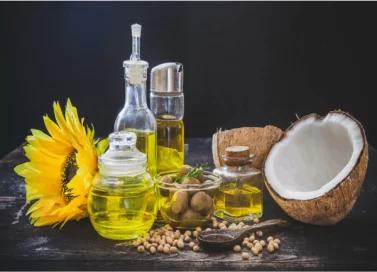- You have no items in your shopping cart
- Subtotal: ₹0.00
Manufacturers remove and separate the oil from the nuts or seeds using a mechanical process known as cold pressing, which involves no chemical interference and involves no addition of any addictive substance at a temperature that will not go over 35 degrees Celsius. The words “cold” and “pressing” both refer to applying pressure to shape, squeeze, or flatten objects, respectively. “Cold” refers to a low ambient temperature.
Since there are no applications of external heat during this process, the necessary nutrients and minerals may be kept inside the oil. With a sufficient number of nutrients and an easy absorption rate by the body, it is one of the finest and healthiest ways to produce oils. Each cuisine has its own particular flavor thanks to the taste of the cold pressed oils. Despite being made this way for many years, these oils have recently become more well-liked. Since then, the individuals in their kitchens have warmed to cold pressed oils. Now that you’ve heard the term “cold pressed oil,” you might be asking what it means, how it differs from other oils, and how it’s produced. You’ll have to read this blog below to get the answers to all of these questions.
What Is Meant By Cold Pressed Oil?
The oil produced by crushing seeds, fruits, vegetables, or nuts into a fine paste is what is known as cold pressed oil. The procedure does not include the use of heat, preserving all of the nutritional value and active enzymes. These trans fatty acids and cholesterol-free oils are beneficial to your health. Oils that are cold-pressed and unrefined retain the flavor, fragrance, and nutritional content of the seeds or nuts from where they are obtained.

Why Are Cold Pressed Oils Healthier Than Refined Oils?
Refined oils are cleansed using a process that is bad for our health since the producer uses acid, bleach, or alkali to treat the oils. Additionally, they use harmful chemicals like hexane, a byproduct of the production of crude oils and the petroleum industry, to filter, neutralize, and deodorize refined oils. Additionally, refined oil has polyunsaturated fatty acids, which are heat-sensitive and unsuitable for deep-frying. Trans fat is produced when oil oxidizes during cooking, which is the main cause of all heat-related issues. Given the minor price difference between refined and cold-pressed oils, should you choose to consume refined oil? While using too much heat during the extraction process may increase the amount of oil produced, the product’s quality may suffer. Additionally, the oil’s inherent health advantages will deteriorate.
How Is Cold Pressed Oil Produced?
You are already familiar with cold pressed oils and how they vary from refined oils from the previously mentioned description. We’ll explain how the cold-pressed oils below are made in the following part.
The seeds or fruits are pressed using a steel or wooden press to produce cold pressed oils. The leftover nuts or seeds will be thrown out as a result of the friction and heat produced by the high pressure as it extracts the oil. After little processing, the oil will still be rich in vitamins, proteins, lecithin, and antioxidants.
Do Cold Pressed Oils Have Health Benefits?
The antioxidants lost in refined oils from excessive heat exposure are retained in organic cold pressed oils. Free radicals that damage the body’s cells are fought off by antioxidants. Vitamin E, which has healing and anti-inflammatory properties, is abundant in the majority of cold-pressed oils. Oleic acid, which strengthens the immune system, is also present in large quantities in these oils. Researchers say that among the oils we may use for cooking are canola, peanut/groundnut, sesame, coconut, sunflower, and olive. More types of food may be cooked easily with minimal oil.
Read More: Benefits of Cold Pressed Sunflower Oil
